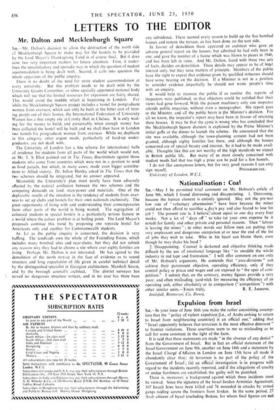LETTERS TO THE EDITOR
Mr. Dalton and Mecklenburgh Square
SIR,—Mr. Dalton's decision to allow the destruction of the north side of Mecklenburgh Square to make way for the hostels to be provided by the Lord Mayor's Thanksgiving Fund is of course final. But it does raise two very important matters for future attention. First, it under- lines the unsatisfactory and sporadic way in which the question of student accommodation is being dealt with. Second, it calls into question the whole apparatus of the public enquiry.
There is no doubt of the need for more student accommodation at every university. But this problem needs to be dealt with by the University Grants Committee, or same specially appointed national body which will see that the limited resources for expansion are fairly shared. This would avoid the muddle which is happening in London. For while the Mecklenburgh Square project includes a hostel for postgraduate women from overseas, which can only be built at the bitter cost of turn- ing people out of their homes, the International Federation of University Women has a fine empty site at Crosby Hall in Chelsea. It is only wait- ing for the money to build, and presumably when enough money has been collected the hostel will be built and we shall then have in London two hostels for postgraduate women from overseas While we duplicate in this category, other urgent needs, particularly of hard-up under- graduates, are not dealt with.
The University of London has a fine scheme for international halls of residence for students from all parts of the world which would not, as Mr. T. S. Eliot pointed out in The Times, discriminate against those students who come from countries which were not in a position to send us food parcels, but which, in many cases, made even bigger contribu- tions to Allied victory. Dr. Julian Huxley asked in The Times that the two schemes should be integrated, but no answer appeared.
Meanwhile the University's plan must surely have been adversely affected by the natural confusion between the two schemes and the competing demands on land, man-power and materials. One of the deplorable results of the situation is the tendency of students from over- seas to set up clubs and hostels for their own nationals exclusively. The great opportunity of living with and understanding their contemporaries from other parts of the world is being wasted. The segregation of coloured students in special hostels is a particularly serious feature in a world where the colour problem is at boiling point. The Lord Mayor's proposals continue this trend by proposing one separate hostel for Americans only and another for Commonwealth students.
As far as the public enquiry is concerned, the decision is very baffling. The landlords own the whole of the Foundling Estate, which includes many bombed sites and near-slums, but they did not submit any reasons why they had to choose a site where over eighty families are living. Perhaps Mr. Dalton is not interested. He has agreed to the demolition of the north terryce in the face of evidence as to sound structure and long expectatiim of life given in careful technical detail by the distinguished specialist in Georgian architecture, Marshall Sisson, and by the borough council's architect. The district surveyor has served no dangerous structure notices, and in no case has there been any subsidence. There seemed every reason to build up the five bombed houses and restore the terrace, as has been done on the east side.
In favour of demolition there appeared an architect who gave an adverse general report on the houses, but admitted he had only been in
one, and gave the number of a house which was blown to pieces in 1940, and has been left in ruins. And Mr. Dalton, faced with these two sets of facts, decides on demolition. These details may appear to be of local interest only, but they raise matters of principle. Members of the public have the right to expect that evidence given by qualified witnesses should have some bearing on the decision. If a Minister is not in a position to consider evidence impartially he should not waste people's time with an enquiry.
It would help to reassure the public if as routine the reports of inspectors were published, so that objectors could be satisfied that their views had gone forward. With the present machinery only one inspector attends public enquiries, without even a stenographer. His report goes to the Minister, and all the public hears is gle Minister's decision. For all we know, the inspector's report may have been in favour of retaining these houses. It may be that the cynic is wrong who has concluded that the Mecklenburgh Square decision is explained by the Prime Minister's initial gaffe at the dinner to launch the scheme. He announced that the site was available, although the town-planning consent had not been granted, although eighty families live there, and although the houses concerned are of special beauty and interest. So it had to be made avail- able. Thoughts like this are not worthy of the high standards we expect in British public life. But many of us most closely concerned with student needs feel that too high a price can be paid for a few hostels.
I do not like anonymous letters, but for very good reasons I can only
University of London, W.C.I.


































 Previous page
Previous page